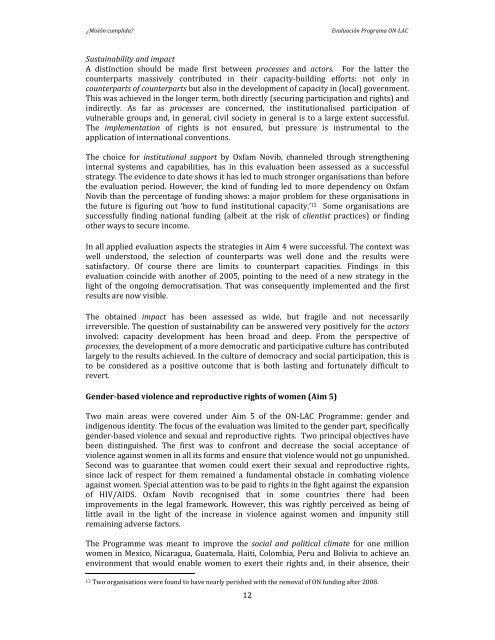¿MISION CUMPLIDA? EVALUACIÓN DEL PROGRAMA DE ... - Novib
¿MISION CUMPLIDA? EVALUACIÓN DEL PROGRAMA DE ... - Novib
¿MISION CUMPLIDA? EVALUACIÓN DEL PROGRAMA DE ... - Novib
You also want an ePaper? Increase the reach of your titles
YUMPU automatically turns print PDFs into web optimized ePapers that Google loves.
¿Misión cumplida? Evaluación Programa ON-LAC<br />
Sustainability and impact<br />
A distinction should be made first between processes and actors. For the latter the<br />
counterparts massively contributed in their capacity-building efforts: not only in<br />
counterparts of counterparts but also in the development of capacity in (local) government.<br />
This was achieved in the longer term, both directly (securing participation and rights) and<br />
indirectly. As far as processes are concerned, the institutionalised participation of<br />
vulnerable groups and, in general, civil society in general is to a large extent successful.<br />
The implementation of rights is not ensured, but pressure is instrumental to the<br />
application of international conventions.<br />
The choice for institutional support by Oxfam <strong>Novib</strong>, channeled through strengthening<br />
internal systems and capabilities, has in this evaluation been assessed as a successful<br />
strategy. The evidence to date shows it has led to much stronger organisations than before<br />
the evaluation period. However, the kind of funding led to more dependency on Oxfam<br />
<strong>Novib</strong> than the percentage of funding shows: a major problem for these organisations in<br />
the future is figuring out ‘how to fund institutional capacity.’ 12 Some organisations are<br />
successfully finding national funding (albeit at the risk of clientist practices) or finding<br />
other ways to secure income.<br />
In all applied evaluation aspects the strategies in Aim 4 were successful. The context was<br />
well understood, the selection of counterparts was well done and the results were<br />
satisfactory. Of course there are limits to counterpart capacities. Findings in this<br />
evaluation coincide with another of 2005, pointing to the need of a new strategy in the<br />
light of the ongoing democratisation. That was consequently implemented and the first<br />
results are now visible.<br />
The obtained impact has been assessed as wide, but fragile and not necessarily<br />
irreversible. The question of sustainability can be answered very positively for the actors<br />
involved: capacity development has been broad and deep. From the perspective of<br />
processes, the development of a more democratic and participative culture has contributed<br />
largely to the results achieved. In the culture of democracy and social participation, this is<br />
to be considered as a positive outcome that is both lasting and fortunately difficult to<br />
revert.<br />
Gender-based violence and reproductive rights of women (Aim 5)<br />
Two main areas were covered under Aim 5 of the ON-LAC Programme: gender and<br />
indigenous identity. The focus of the evaluation was limited to the gender part, specifically<br />
gender-based violence and sexual and reproductive rights. Two principal objectives have<br />
been distinguished. The first was to confront and decrease the social acceptance of<br />
violence against women in all its forms and ensure that violence would not go unpunished.<br />
Second was to guarantee that women could exert their sexual and reproductive rights,<br />
since lack of respect for them remained a fundamental obstacle in combating violence<br />
against women. Special attention was to be paid to rights in the fight against the expansion<br />
of HIV/AIDS. Oxfam <strong>Novib</strong> recognised that in some countries there had been<br />
improvements in the legal framework. However, this was rightly perceived as being of<br />
little avail in the light of the increase in violence against women and impunity still<br />
remaining adverse factors.<br />
The Programme was meant to improve the social and political climate for one million<br />
women in Mexico, Nicaragua, Guatemala, Haiti, Colombia, Peru and Bolivia to achieve an<br />
environment that would enable women to exert their rights and, in their absence, their<br />
12 Two organisations were found to have nearly perished with the removal of ON funding after 2008.<br />
12



